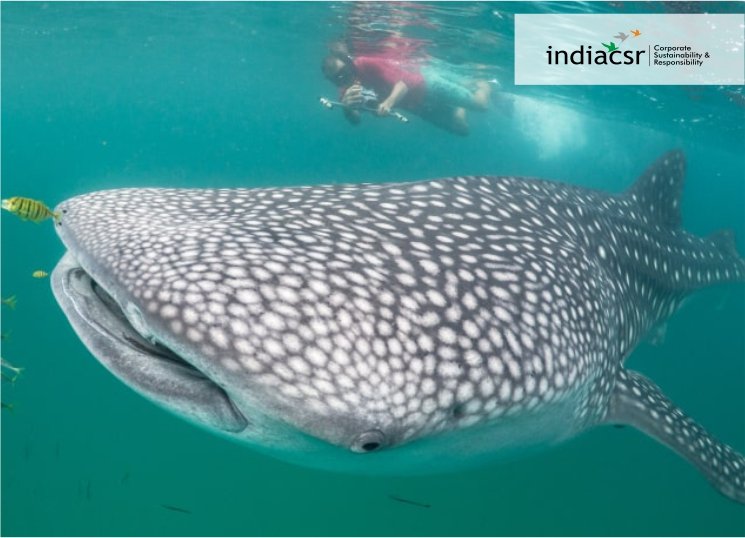By Rusen Kumar
‘Project Whale Shark’ supported by Tata Chemicals is India’s only attempt to generate baseline data on the Whale Shark to aid its long-term conservation, involving general awareness and scientific studies through photo-identification, genetic analysis and satellite tagging.
Located on the north-western coast of India, LMithapur is known as the birthplace of Tata Chemicals Limited (TCL), where its first plant was created in 1939. Over the years, as anticipated the region raised a wealth of marine chemicals and went on to play a key role in turning Tata Chemicals’ humble beginnings to a global chemical industry behemoth, with operations across four continents.
Staying true to the company’s guiding principle of ‘serving society through science’; Tata Chemicals leads the market of branded iodized salt, which it pioneered to eradicate nutritional deficiencies in the country. Today the company is also the innovative force behind the launch of India’s most affordable, nanotechnologybased water purifier Tata Swach, targeted to provide safe drinking water to the masses.
Tata Chemicals for the past 75 years has been applying its expertise in sciences to develop high-tech and sustainable products and to transform lives in various ways – fertilizers, industry essentials, pulses, salt, pure drinking water etc. Quite aptly, concentrating its goal of transformation, Tata Chemicals put in its efforts to preserve the bio-diversity of land along the Gujarat coastline and the nesting sites of migratory birds. And, in one such step to build sustainable ecosystems and to preserve the bio-diversity of land, Tata Chemicals along with the Wildlife Trust of India (WTI) launched Project ‘Whale Shark’ – a conservation project to create awareness and undertake research to save the endangered species of Whale Shark (rhincodontypus) that visits the coastal shores of Gujarat.
Whale Sharks are the largest fish in the ocean and can grow up to 45 feet in length. In India, they are found most frequently in the Arabian Sea, along the shores of Gujarat in western India. Unfortunately here it was hunted in hundreds for its liver oil to water proof boats and also for its meat, which was exported. In 2000- 2001, over 500 Whale Sharks were estimated to have been massacred along the Gujarat coast. It was in the same time that the Whale Shark became the first fish to be listed in Schedule I of the Indian Wildlife Protection Act, 1972.
Few people, other than the fishermen who hunted it, even knew that Whale Sharks existed in Gujarat waters. Whale Sharks were called ‘barrel’ here, as empty barrels were used as floaters to mark and capture them after harpooning. Each hunted Whale Shark brought fishermen USD 1125 – 2250, making it a lucrative catch. Legal until 2001, Whale Shark hunting was banned after it became the first fish to be listed under Schedule I of the Wildlife (Protection) Act, 1972, under sub section (1) of section 61, on May 28, 2001. This protection and ban was initiated by a documentary film, ‘Shores of Silence’ by Mike Pandey that brought to light the brutal slaughter of the fish in western India. The following year, persistent efforts by India and Philippines got the Whale Shark placed under Appendix II of the CITES.
However, the Whale Shark remained vulnerable on these shores. A Taylor Nelson Sofres (TNS) survey was conducted in 2004 in Ahmedabad and Veraval to assess the awareness levels and attitudes towards the Whale Sharks, indicated low awareness of this hunted species and prompted the need for a campaign among the fishing community and other stakeholders to conserve these ‘gentle giants’ and ensure their longer term survival. The Whale Shark Campaign was jointly launched in January 2004 Tata Chemicals, Wildlife Trust of India, International Fund for Animal Welfare, Gujarat Forest Department,), the Coast Guard, the Indian Navy, the Ministry of Environment and Reefwatch to spread awareness, educate and change perceptions about the fish among specific target groups in the region.
It is the collaboration and support of various stakeholders to provide financial assistance and create awareness in the fishing community. Street plays, games, posters, inflated Shark flotillas, postage stamps and school art competitions became grist for the mill in building awareness. It led to the success of the Whale Shark Campaign and positioned the campaign for the next stage of scientific monitoring.
IMPLEMENTATION
Undoubtedly the gentlest and indeed the largest fish in the world, Whale Sharks come swimming all the way from the seas off the shores of Australia to the coast of Saurashtra, Gujarat, between September and May, to spawn in these waters. Official figures reveal that before 2001, over 150 Whale Sharks were poached along the Gujarat coast.
Independent figures however put this number at 500. This was particularly alarming because the Whale Shark does not attain sexual maturity before the age of 30 years, and poaching at this rate would pose a serious threat to its breeding and in turn upset the fragile marine ecosystem. Spreading awareness among the locals about this fish was thus perceived as the key to protecting this species. The Whale Shark Campaign was hence, flagged off amid its widespread brutal slaughtering that happened along the Gujarat coast for export.
The demographics of the area consisted of fishermen folk of the coastline, who made huge profits by way of the slaughtering of Whale Sharks for its liver oil to waterproof boats and also for its meat, which was exported. On May 28, 2001, Whale Shark hunting was banned in India, following it being listed under Schedule I of the Wildlife (Protection) Act, 1972, which was triggered by the documentary ‘Shores of Silence’ by Mike Pandey. Prior to this, few people, other than the fishermen who hunted it, ever knew that Whale Sharks existed in Gujarat waters.
As the conservation programme rolled on, it was a first of its kind to pave way for voluntary conservation at this scale. The fishing community willingly agreed to sacrifice its economic gain and has displayed exemplary sense of responsibility to the marine environment in which they live. The government also came forward to provide relief for the loss of net to the extent of Rs 25,000 and WTI worked as a catalyst with Tata Chemicals actively supporting the cause. The Coast Guard too joined the programme both as motivator of community and also in keeping vigil.
The Whale Shark Campaign was jointly launched in January 2004 by Tata Chemicals, Wildlife Trust of India, International Fund for Animal Welfare, Gujarat Forest Department), the Coast Guard, the Indian Navy, the Ministry of Environment and Reefwatch to spread awareness, educate and change perceptions about the fish among specific target groups in the region.
From profit to people and to the planet, an effective CSR policy is a vision of this triple-bottom line concept. Maintaining bio-diversity is as important as producing quality products. It is when a company can improve the quality of life of the local community and maintain the bio-diversity standards that they have delivered a worthy CSR policy. This conception helped Tata Chemicals’ internationally acclaimed Project ‘Whale Shark’, unveiled at Mithapur, Gujarat, where the 75-year old, LIFE – Living, Industry and Farm essential solutions provider was incepted.
EMOTIONAL CONNECTION
Reports of young pups in the waters of Gujarat, suggested that Whale Sharks breed here. Morari Bapu famous for his spiritual lectures ingeniously equated the Whale Shark to a daughter of Gujarat. He called it ‘Vhali’or ‘dear one’ and likened it to a pregnant daughter who returns to her parents’ home to give birth to her child; a custom practiced in many parts of India and especially in Gujarat. This drew a huge response from the people.
LEVERAGING OF SOCIO-CULTURAL BELIEFS
The campaign strategy also leveraged Indian traditional and cultural ethics of ‘Ahimsa’ (non-violence) and ‘Atithi Devo Bhava’ (Guest is God). This was publicized through street plays put up in fishing villages and towns.
CHILDREN AND YOUTH FOR GROUNDSWELL RESPONSE
Thousands of school children and young people were involved in the campaign across Gujarat. There were rallies, marches, painting competitions and exhibitions. This helped create a tremendous groundswell response.
CREATION OF A FLAGSHIP
‘Project Whale Shark’supported by Tata Chemicals is India’s only attempt to generate baseline data on the whale shark to aid its longterm conservation, involving general awareness and scientific studies through photo-identification, genetic analysis and satellite tagging. The Campaign faced several challenges during the early stages, as the fisherfolk needed to be educated about the need to conserve the flora and fauna of the region. “The Tata Group has always been on the forefront, when it comes to caring for the environment. Our thrust has been to sensitise people and create awareness about these endangered species,” the then Managing Director of Tata Chemicals PR Menon commented.
Tata Chemicals’ Mithapur plant’s employees joined the campaign, got actively involved in conservation work as part of the Amateur Rangers Nature Club programme. A lot of ideas were thrown up by Tata Chemicals employees who volunteered for the project. One of the ideas was of having an inflatable model of the Whale Shark which could travel to various towns and villages as a part of the awareness campaign. This life-sized inflatable model of the Whale Shark added a touch and feel element to the campaign. True to this image, Vivek Talwar, Head-HR, Mithapur Works, and his team of enthusiastic conservationists at Tata Chemicals have provided unfailing support in financing and equipping the campaign. Their continued support for the campaign would enable WTI’s message of conservation to reach the masses to generate awareness and sensitivity about this endangered fish in dire need of protection.
EVENTS
Marking the first step of the campaign, in 2004, a lifesized model of a Whale Shark was inflated on the premises of Tata Chemicals drawing huge crowds that watched a street play on the protection of the world’s largest fish with rapt attention. “Tata Chemicals strongly believes that maintaining bio-diversity is as important as producing quality products. While improving the quality of life of the local community and maintaining bio-diversity standards at the same time, Tata Chemicals truly is a company that cares, “the then Head of Corporate HR and Communications, B Sudhakar elaborated.
The first ripples appeared with the launch of a street play with a message on protecting the shark on the International Theatre Day at Mithapur, Gujarat, on March 27. The first show of the play was held on TCL’s Mithapur premises. The performers traveled along the coast of Gujarat and staged 16 performances in 12 towns. The group carried the play through major fishing harbours and ports, such as Beyt Dwarka, Somnath, Veraval and Okha. The series of performances culminated at Diu on April 2. The second phase of this campaign took off at TCL Mithapur in April with the 50 ft inflatable model of the whale shark in the background. The model was an instant crowd puller. Its sheer size generated enormous excitement and awe in a community which had never seen a model of this magnitude before.
Children and parents alike were drawn to the inflatable, trying to touch and feel it. The inflatable was designed to be the backdrop for a series of street plays on the species, which are a part of the campaign to give the people of Gujarat a feeling of pride for this fish. Tata Chemicals organized ‘Whale Shark Mela’, a fair to celebrate the successful conservation of more than 360 Whale Sharks, the world’s largest fish, along the Gujarat coast in western India. Street plays were organized and enacted by professional theatre groups within the community. The play was conceptualised to spread awareness and build sensitivity among the fishing community.
The story touched popular sentiment because it carried forth the message of the immensely popular spiritual leader, Morari Bapu who formally launched the campaign in Gujarat as an ambassador for the Whale Shark. In his address at the launch of the campaign, he likened the Shark visiting the shores of Gujarat to a daughter visiting her parents and said, “It is indeed sad that fishermen hunt this gentle giant instead of protecting it and creating an environment conducive for it to breed.”
Gujarat began releasing back the Whale Sharks which were accidentally caught in their nets. As on 2013, the total number of release stands at more than 350. “Satellite tagging is a significant exercise for conservation of this endangered species. Tagging will aid in exploring new facts and data on Whale Shark habitats and provide precise information on migratory patterns, breeding and survival off the Gujarat coast,” Alka Talwar, Head of Corporate Social Responsibility at Tata Chemicals said.
The Whale Shark conservation campaign and the Mithapur coral reef securement project; two of the largest corporate supported ongoing conservation initiatives in India, are aimed at creating a conducive environment for the well being and breeding of marine life species in the coastal belt of the country and serve as a global role model to conserve these endangered habitats. Going ahead, Tata Chemicals hopes to take this project to the coastal region of Maharashtra and other southern parts of the country. It is also looking at options for promotion of eco- tourism in these coastal areas along with providing critical data to the global scientific community so as to ensure the fish’s long term survival.
Satellite tagging is a significant exercise for conservation of this endangered species. Tagging will aid in exploring new facts and data on Whale Shark habitats and provide precise information on migratory patterns, breeding and survival off the Gujarat coast.
As per our mission of ‘serving the society through science’, improving the quality of life of the local community forms the core of our ideology, maintaining the biodiversity is simply the next step in achieving holistic environmental stewardship. The Whale Shark Project is one of the leading example of unrelenting efforts by Tata Chemicals along with partners like Gujarat Government, Coast Guard and WTI to maintain the habitat of the region and prevent any environmental abuse by generating mass awareness and continuing to support conservation in every way. – R MUKUNDAN Managing Director Tata Chemicals
A multi-stakeholder approach also helped to simultaneously create awareness across all concerned – fishermen, school children, government officials, etc. Many of the coastal cities and towns in Gujarat (including Dwarka, Okha, Porbander, Veraval, Mangrol, Diu and others) adopted the Whale Shark as their mascot and the locals pledged to protect the fish. Some of these cities even have Whale Shark Day celebrations on Karthik Amawas (new moon day in November).
Campaign Ambassador
The campaign, a rare joint venture between NGOs, corporate and government, chose Morari Bapu, a popular spiritual leader to endorse its cause. He then appealed to the people to save the Whale Shark on emotional and socio-cultural grounds.
Funded by Tata Chemicals with a corpus of Rs 2 crore, the ongoing initiative is also in collaboration with Gujarat State Forest Department, the National Institute of Oceanography and other marine experts from the national and international arena.
IMPACT
With Morari Bapu’s support, the campaign acquired deep emotional overtones and impacted the fisher folk in a big way. Many of them started releasing the whale sharks caught in their nets. The Government of Gujarat reciprocated by providing cash relief to the fishermen for net damages in the process. Since then, a total of 363 Whale Sharks had been rescued and released as of March 19, 2013, of which 52 were documented by the fishermen on cameras provided to them.
As many as 1,115 waterproof cameras have been given to fishermen to capture photographs of the fish and of rescue operations both as proof for availing the cash relief from the Gujarat Forest Department and also to provide greater information about the Whale Sharks that visits the Gujarat coast. In 2008, Tata Chemicals, along with WTI and the Government of Gujarat, gave the project a fillip by undertaking scientific study of the habitats, feeding habits and migratory patterns of the Whale Sharks. This was done through satellite tagging –been done successfully to study the seasonal movement of the fish.
Tata Chemicals has also sponsored several scientific studies of the Whale Shark including through collection of genetic samples to find out how different these Whale Sharks are from those in other parts of the world. In the same year, the Gujarat Forest Department and Wildlife Trust of India (WTI), had entered into a memorandum of understanding (MoU) for a conservation research programme on whale sharks and corals.
Tata Chemicals and WTI signed an MoU for a conservation project to create awareness and undertake research and to save the endangered species of Whale Sharks that visits the coastal shores of Gujarat. The MoU also undertook a study to explore Whale Shark tourism opportunities in the region which makes this project a unique and first-of-its-kind in the country.
Funded by Tata Chemicals with a corpus of Rs 2 crore, the ongoing initiative is also in collaboration with Gujarat State Forest Department, the National Institute of Oceanography and other marine experts from the national and international arena. With a mission of serving society through science, Tata Chemicals took the project to a next level, commemorating the contribution made for this novel initiative with a day-long celebration aptly named as the ‘Whale Shark Day’that is undertaken every year and the efforts have borne fruits.
In 2009, on the celebration of the ‘Whale Shark Day’ Satish Anand, corporate HR and corporate affairs, chemicals business and consumer products business, Tata Chemical, noted, “Tata Chemicals has a long history of social initiatives that touch upon the lives of the people and the communities where we operate our business.
Preserving bio-diversity forms the basis for sustainable development. Addressing this objective, Tata Chemicals has committed itself to the Whale Shark Project – our first major step in conservation efforts towards a cause of global importance. This Project has seen success in sensitising people by creating mass awareness, supporting longterm conservation goals through scientific studies and also preserving the rare species from illegal poaching. It has been a fruitful project in maintaining the ecology of the region.-R NANDA Vice President Corporate HR and Corporate Communications Tata Chemicals
“We strongly believe in working closely with the people and also believe that the natural surroundings should benefit from the various initiatives undertaken. Since its inception, the Whale Shark Conservation Project has grown in leaps and bounds, and people’s support reflects in the 187 Whale Sharks that have been saved till date. We are proud of achieving this unique milestone. We at Tata Chemicals are committed to support the flora, fauna and the wildlife species and will take our best step forward in conserving the nature and its rare mammals in years to come.”– Tata Chemicals
The year 2013 has been a landmark for the ‘Project Whale Shark’ completed the second tagging to be done of the giant specie. The female Whale Shark tagged in December 2013, was a female, around 18 ft long. “Following the success of the Campaign since 2004, the fishing community in Gujarat began releasing back the Whale Sharks which were accidentally caught in their nets. This Whale Shark tagged was caught in fishing net and has been released post tagging.
This is the second such example in the country,” said Prem Jothi, the WTI biologist who implanted the tag. Following the success of the Campaign since 2004, the fishing community in Gujarat began releasing back the Whale Sharks which were accidentally caught in their nets. As on 2013, the total number of release stands at more than 350.
“Satellite tagging is a significant exercise for conservation of this endangered species. Tagging will aid in exploring new facts and data on Whale Shark habitats and provide precise information on migratory patterns, breeding and survival off the Gujarat coast,” Alka Talwar, Head of Corporate Social Responsibility at Tata Chemicals said.
The Whale Shark conservation campaign and the Mithapur coral reef securement project; two of the largest corporate supported ongoing conservation initiatives in India, are aimed at creating a conducive environment for the well being and breeding of marine life species in the coastal belt of the country and serve as a global role model to conserve these endangered habitats. Going ahead, Tata Chemicals hopes to take this project to the coastal region of Maharashtra and other southern parts of the country. It is also looking at options for promotion of eco- tourism in these coastal areas along with providing critical data to the global scientific community so as to ensure the fish’s long term survival.
Going ahead, Tata Chemicals hopes to take this project to the coastal region of Maharashtra and other southern parts of the country. It is also looking at options for promotion of ecotourism in these coastal areas along with providing critical data to the global scientific community so as to ensure the fish’s long term survival.
(Source: CSR & COMPETITIVENESS, FEBRUARY 2014)
Term & Conditions: India CSR dose not permit other websites/Agency to copy or reproduce or reprint the above article in any form.
Disclaimer: The views expressed by the author in this feature are entirely his own and do not necessarily reflect the views of India CSR.
About Author: Rusen Kumar is globally renowned journalist writing on CSR issues. He can reached at rusenk@indiacsrnetwork.com
Twitter Handle: @INDIACSR























